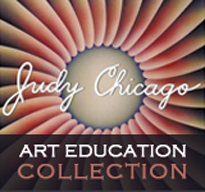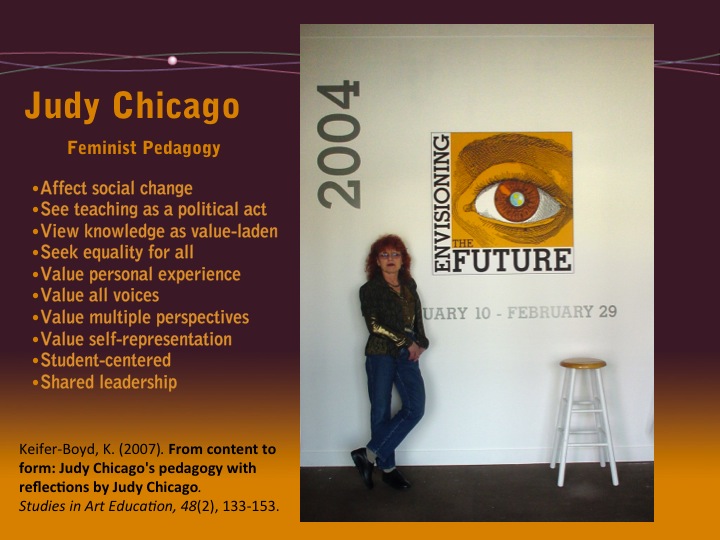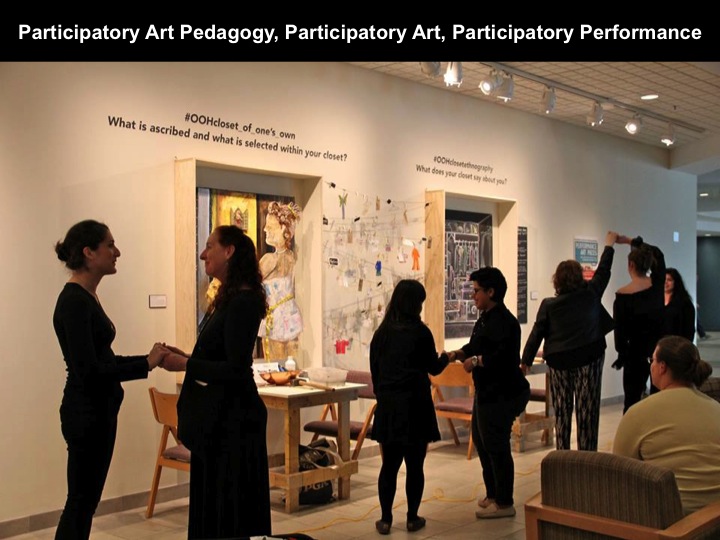Join the Dialogue Go to Dialogue
Vision for the Judy Chicago Art Education Collection at Penn State (27 min. video)
Karen Keifer-Boyd
Chicago has planted strong roots of feminist art education from which have flowered diverse forms of feminist art. Many of Chicago’s students established successful careers as artists (e.g., Suzanne Lacy, Faith Wilding, Nancy Youdelman). Fortunately, Chicago kept slides, photographs, and video of the student work that came from her teaching projects, as well as her planning materials and teaching reflections, which are included in the Penn State archives. This presentation looks to possibilities for research and teaching with the collection.
The Dinner Party Curriculum Project as a Living Curriculum (32:08 min. video)
Marilyn Stewart
The Dinner Party Curriculum Project, now in its eighth year, began when, at the request of Judy Chicago, a group of faculty at Kutztown University convened to merge substantive ideas about curriculum with the meanings embedded in and suggested by The Dinner Party. This presentation highlights the multiple pathways followed since that time, bringing this iconic artwork to life for K-12 teachers and their students.
Judy Chicago’s Art Pedagogy (12:39 min. video)
Karen Keifer-Boyd
Dismayed with the patriarchal system of educating artists, Judy Chicago developed a feminist art pedagogy that empowered women to recognize that their experiences could be a catalyst for art. From founding the first program dedicated to feminist art in 1970 to recent groundbreaking group projects with students at universities throughout the United States, Chicago’s art pedagogy is a feminist reconceptualization of studio art teaching.
Teaching Conversations (54:32 min. video)
Karen Keifer-Boyd (00:00—13:58 min.)
Teaching Conversations is a project initiated by Karen Keifer-Boyd that involves a group of Penn State feminists who, in fall 2011, began to engage in conversations about the Judy Chicago Art Education Collection, specifically about ways to use it in their teaching. This panel presents four generative teaching projects with the collection.
Issues in the Use of Artistic Representations of Historical Events: Judy Chicago’s Holocaust Project
Linda Short (13:59—23:42 min.)
The subject of the Holocaust can be both intellectually and psychologically challenging. The study of history is typically approached by examining events and statistics, but undergraduate students in Hist/JST 121: The History of the Holocaust,1933-1945 used the medium of art as a complementary point of entry. Beginning with Judy Chicago and Donald Woodman’s Holocaust Project, students in Linda Short’s course enlarged their understanding of this historical period through original research into the stories of a variety of artists and their art, while also confronting the limitations of artistic representation.
An Open Invitation: Teaching Feminism with The Dinner Party
Jennifer Wagner-Lawlor (23:43—36:53 min.)
In this panel talk, Jennifer Wagner-Lawlor discusses incorporating The Dinner Party as the central metaphor and organizing structure for a course introducing students to basic feminist principles, and to a range of important figures in the women’s movement. Strategies for moving the students from the historical moment to the contemporary moment, by asking them to invite their guests to The Dinner Party table, give students a rich and living sense of feminist movement.
Feminism and Diversity Matters in Art Education
Wanda B. Knight (36:54—47:00 min.)
Diversity, Visual Culture, and Pedagogy, an undergraduate art education course, explores issues of diversity in various contexts: schools, mass media, art worlds, museums, and community arts organizations. In this presentation, Wanda Knight highlights feminist pedagogical strategies she used to challenge course participants’ socially constructed frameworks as learners and prospective teachers.
Judy Chicago WebQuests
Yen-Ju Lin (47:01—54:32 min.)
In the course AED322: Visual Culture and Educational Technologies, Yen-Ju Lin used Judy Chicago’s participatory art pedagogy to facilitate the process of conceptualizing and creating the WebQuests, a collaborative project with Jennifer Motter and her students at Forest Hills Middle School. In this project, students were guided to develop their WebQuest ideas by translating/expanding one or more of the fourteen encounters of The Dinner Party Curriculum Project in the Judy Chicago Art Education Collection.
Then & Now: Reflections on Feminist Art Teaching (49:26 min. video)
Nancy Youdelman
From Nancy Youdelman’s first-hand experience in the 1970-71 Fresno Feminist Art Program (FAP) taught by Judy Chicago and the CalArts FAP (1971-73), in which she worked on the acclaimed Womanhouse, Youdelman presents how these experiences impacted her art and teaching. Reflections include her one-month teaching artist residency at Penn State in 2014 as part of a course facilitated by Karen Keifer-Boyd using Judy Chicago’s pedagogical principles.
Applying Judy Chicago’s Participatory Pedagogy, Art, & Performance
in the Spring 2014 Out of Here Teaching Project, Exhibition, and Series of Five Performances
A multimedia presentation of Judy Chicago’s Participatory Pedagogy is at http://judychicago.arted.psu.edu/participatory-art-pedagogy/
The term participatory used to describe Judy Chicago’s teaching methodology is rooted in democratic practices that provide a space for each to speak and a community support structure in which different views are encouraged to be expressed and argued without retaliation from the group. It is an organic process brought to full-bloom by the people participating in the art project. The coming together into a circle is both symbolic of the group generating energy to sustain and support the creation of powerful artworks, and a literal approach to including and listening to all who comprise the circle of the group.
Out of Here Participatory Pedagogy, Art, & Performances
For an example of applying Judy Chicago’s teaching methodology see the Out of Here course, spring 2014.
Compilation of Five Out of Here Participatory Performances with reflections on experiencing participatory pedagogy, art, and performance (84 min. or 3 min. excerpt)
- Closet Ethnography (89 min. or 7 min. excerpt)
- Closet Cakes (50:12 min. or 7 min. excerpt)
- Comfort Women (72 min. or 7 min. excerpt)
- The Tea is Ready (90 min. or 7 min. excerpt)
- Out of Here (94 min. or 7 min. excerpt)
Closet Ethnography (89 min. or 7 min. excerpt) Closets are cultural places where identity is fantasized, archived, questioned, and molded. Closets are places for mourning, reflection, and celebration. Closets hold material symbols of life stories, if we pause and pay attention. From clothes that celebrate rites of passage, and stored items worn by deceased loved ones, to secret journals or items hidden away or in a locked safe, this private world receives daily interaction but is rarely mentioned. Closets are making, reflective, redemptive places for mourning and honoring. What stories does your closet tell?
Twitter @OOHclosetcakes hashtag: #OOHclosetethnography
Closet Cakes (50:12 min. or 7 min. excerpt)Commitment, dreams and re-vision: the process of building, spilling, joining, separating, breaking and joining is the active creativity and conception of women artists within the studio space. The creating of objects, a reflective and meditative expression is metaphorical of the life cycle and the environments that create our existence. Much in the same way that cake is prepared, mixed, baked, iced and consumed, so is the woman in society. What varieties are there? How and when are women created and consumed in society? What environments are we born from? What flavor are we and for whom?
Twitter @OOHclosetcakes hashtag: #OOHwomb
Comfort Women (72 min. or 7 min. excerpt) Kang Duk-kyung (1929–1997), a survivor of comfort women, neither married nor had a family, is honored by Hyunji Kwon, Karen Keifer-Boyd, Nancy Youdelman, Jeanne Weber, Nouf Alhamdan, Helen Geleskie, Veronica Hicks, Amy Migliore, Farima Safaitakhtehfooladi, and Leslie Sotomayor. Her abject body can be honored, respected, and allowed to rest in peace.
Twitter @OOHclosetcakes hashtag: #OOHcomfortwomen
The Tea is Ready (90 min. or 7 min. excerpt) During this participatory performance, scripted and facilitated by Farima Safaitakhthefooladi, participants explored the changes Iranian women have faced in four periods: Pre-Islamic Iran, Arab Conquest of Iran, Pahlavi Period, and following the 1979 Iranian Revolution when Iran became an Islamic Republic.
Twitter @OOHclosetcakes hashtag: #OOHsheWRITES
Out of Here (94 min. or 7 min. excerpt) The final performance of the exhibition, “Out of Here” on April 17, 2014 at Penn State’s HUB-Robeson Galleries Art Alley focused on Helen Geleskie’s Confidence Confessional and Nouf Alhamdan’s Coded Cakes. Participants used their cell phones to take selfies and responded to prompts above each work of art. They posted the selfies and responses to the Out of Here social media pages (Twitter @OOHclosetcakes#OOHconfession)
- This forum has 6 topics, 126 replies, and was last updated 4 years, 7 months ago by .
-
- Topic
- Voices
- Last Post
-
- ACTIVISM 1 2
- 18
- 5 years ago
- POWER 1 2 3
- 26
- 5 years ago
- You must be logged in to create new topics.


